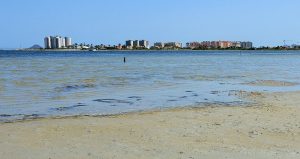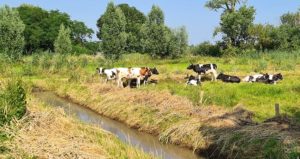Legal rights Mar Menor under fire

-
 Editorial Team
Editorial Team
Share article:
The regional Spanish organisations for farmers COAG and UPA in Cartagena asked the regional government to adjust the legal rights of the Spanish lagoon Mar Menor in the beginning of July. According to these organisations the legal rights have become a sword of Damocles for the agricultural sector. The farmers state they do not want to harm the ecosystem, but according to them the law needs to be adjusted to reality.
The farmers stated in an interview with the local radio station that they are now using the best available techniques to prevent pollution of groundwater and the acquifer. The legal rights of the Mar Menor is setting limits to the agricultural production and causing unnecessary difficulties for farmers. Therefore they want to reach consensus to modify the law for the recovery and protection of the Mar Menor, relying on common sense and science.
First legally protected ecosystem
Europe’s biggest saltwater lagoon, the Mar Menor in Spain, became in September 2022 the first ecosystem in Europe to be granted legal status as a person. The move, ratified by the government in Madrid, is part of a growing worldwide rights of nature movement. The legal status must save the heavily polluted Mar Menor in Murcia, in the south-east of the country. Professor of Philosophy of Law and Director of the Chair of Human Rights and Rights of Nature at the University of Murcia Teresa Vicente, initiated the legal status of the Mar Menor. In May 2024 she won the Goldman Environmental Prize, the so-called European green Nobel for promoting the Popular Legislative Initiative that granted legal personality to the Mar Menor in Murcia.
Broad social consensus is needed
COAG considers that the legislation is not adequate because it focuses only on regulating agricultural activity, and wants regulations for all activities. COAG assures that agricultural activity does not contaminate the subsoil and regrets that the response to the environmental problem of the lagoon has focused on regulating agriculture, tiptoeing around the rest of the activities that take place in the salt water lagoon. The UPA thinks that the adjustment of the law should be seen as an improvement. It can be done by listening to the agricultural sector, but also to neighbours, environmentalists and scientists. We want the new law to be the product of a very broad social consensus, but also a parliamentary one.
Legal initiative
The legal status followed a concerted campaign by scientists, environmentalists and lawyers to push for the legal distinction. “The rights of nature are already a reality in several legal systems around the world, it is part of the international legal vanguard and the process is unstoppable,” wrote Teresa Vicente. She gathered more than the 500,000 signatures needed to launch the legal initiative. She said the reasons that have led Spanish citizens to propose a law that recognises the legal personality of the Mar Menor lagoon and its basin, in order to provide it with its own rights, are the serious ecological damage it has suffered, the ineffectiveness of the current legal regulations that have sought to protect it, and the empowerment of civil society to make participation in environmental matters effective.
History
The rights of nature idea comes from indigenous peoples. It states that nature holds inalienable rights, and that threatened parts of nature, such as a river or mountain range, should be provided with legal standing to defend itself. In western culture the idea gained traction after a 1972 paper, written in support of a legal challenge to a ski resort, by a Californian legal philosophy professor, Christopher D. Stone, titled: ‘Should Trees Have Standing? Toward Legal Rights for Natural Objects’.
More European initiatives
The Mar Menor is now legally competent to appear as an injured party in the second, investigation phase. Any legal moves will be closely watched by the European Hub of the Global Alliance for the rights of Nature. There are a number of European proposals to recognize the rights of specific natural areas including the Loire, the Meuse in the Netherlands, the Rhône in Switzerland, and Lake Vättern in Sweden.














